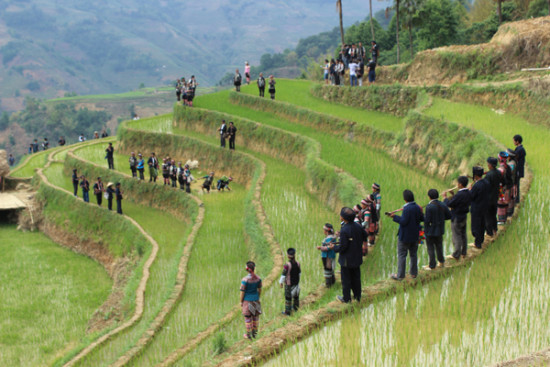
Members of the Hani ethnic group in Puchun village in Yunnan province's Honghe county, Honghe Hani and Yi autonomous prefecture, sing their polyphonic folk songs, which are listed as national intangible cultural heritage. (Wang Kaihao/China Daily)
"Hani music has an important function in daily life," Wu says. "People sing to worship ancestors and nature. When I first organized villagers to perform a chorus in front of visitors, many initially refused. They consider the process sacred and secret.
"It is blasphemous to perform seedling-transplanting songs when it is not the season for that farmwork. We need to explore a more diverse repertoire of Hani festivals and rituals."
Similar rescue attempts have been made in nearby Yuanyang county in the same prefecture. Hani Ancient Song (Hani-haba), which is considered an "epic of Hani people", was registered as national intangible cultural heritage in 2006. After the Hani Terraces were recognized by UNESCO, the local government began a project to establish a database of recorded musical scores and scripts. It also plans to teach relevant courses in local primary schools.
Hani-haba is also spreading internationally. Eight community members will perform the traditional music at the Expo 2015 in Milan. However, despite the promising developments, the ongoing viability of the music is still in doubt.
"If traditional Hani music fails to become known by the outside world, it will soon perish," Zhu Lihong, deputy director of the prefecture's cultural bureau, says. "However, simple presentations of techniques are also far from enough, and relevant academic research is insufficient."
"Generally speaking, today's adaptations of ethnic music in Yunnan are superficial. We need to truly explore the humanity and characteristics beneath the surface," says Huang Hui, a Beijing-based musician best known for his work with ethnic music.
He says that after the polyphonic Dongzu Dage choir (Grand Song of the Dong People) from Guizhou province became a worldwide hit, other ethnic communities in southwestern China started to embellish their original songs by adding harmonies to realize similar success.
"Traditional Hani polyphonic folk songs usually only have three basic parts and impromptu variations, but we often find many parts deliberately added to performances," he says. "Authenticity is more important than complexity. If we apply Western music criteria to judge folk music, it will be very dangerous."
Nevertheless, practitioners of Western music are still able to learn from Hani folk music to create unique flavors. For example, China National Symphony Orchestra plans to hold a concert next spring presenting their adaptation of traditional Hani music.
"Some unique parts of Hani music aren't found elsewhere and are able to change the music textbooks," says Guan Xia, director of CNSO, who recently visited Honghe to prepare for the new work.
He says that unlike most folk music styles in China, which usually have a stable tonality, Hani songs have abundant varieties and freer expressions.
















































